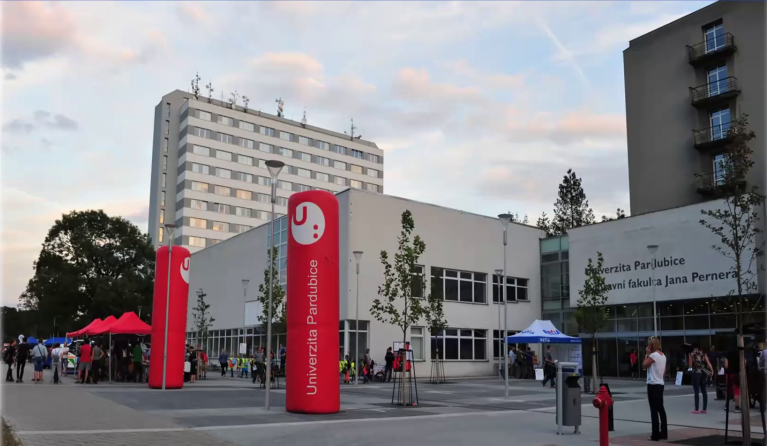

University of Pardubice
The tradition of higher education in Pardubice dates back to the first months after the Second World War and is very closely connected to the development of the transport network and food, machine and chemical industry in the city and the region. In the autumn of 1945, local chemical factories suggested the establishment of a chemical college in Pardubice. Five years later, on 27 June 1950, the Czech government established the Chemical College. Classes started on 15 October 1950 in the restored buildings of the former Technical College of Food Industry. In the following academic year, the former building of the Technical College of Engineering was reconstructed for the needs of the Chemical College and since then has been in use as the main building of the Faculty of Chemical Technology in the Čs. Legií Square. In November 1953, the school became an independent body like the Institute of Chemical Technology headed by a Rector. Since 31 March 1994, the original Institute of Chemical Technology has the status of university under the new name Univerzita Pardubice (University of Pardubice). During the more than 65 years of its existence, the Institute of Chemical Technology and later the University of Pardubice has become an important center of education producing more than 15,000 professionally trained graduates. The University, with its more than 8,000 students and highly professional academic staff, is deeply rooted in Pardubice and the whole region, enriching and inspiring the community culturally.
Faculty of Transport Engineering bears the name of the important Czech railway track designer Jan Perner (name of the faculty in Czech is “Dopravní fakulta Jana Pernera”). The Faculty offers students a quality education in transport structures, technology and control, management and marketing, logistics, operation and maintenance of vehicles, vehicle design, electric traction and electromobility and engineering, technology and management of air transport, and prepare experts for the public and private transport sectors. Modern study and technology facilities for both theoretical and practical education are provided on the main campus in Polabiny, in the Education and Research Center in Transport in the Technology Complex in Doubravice and on the deployed workplaces in Prague and Česká Třebová.
The faculty provides a comprehensive education in the field of transport. The goal is to prepare experts for both private and public transport companies and also for manufacturing, construction and business firms; research and project organizations; state administrations and education institutions. The graduates of the faculty are aimed to be professionals who will be able to design, organize and manage technological and information processes in transport and forwarding systems, operate the internet business, effectively communicate with customers and superior authorities, carry out acquisition and forwarding services, manage and execute construction and building activities in the field of transport vehicles and infrastructure, designing drivers and electronic systems of transport vehicles, ensuring the operation, repair and maintenance of vehicles and infrastructure while identifying their impact on the environment.
Students can study bachelor's, master's and doctoral study programmes and branches of study.
The history of the faculty began in 1992, when the Department of Transport was established at the then Institute of Chemical Technology in Pardubice, today's University of Pardubice, which became the foundation of the independent faculty. The Faculty of Transport Engineering, which was established in April 1993, became the successor to the tradition of transport faculties in former Czechoslovakia.
The Faculty of Transport Engineering engages in international research and educational mobility programmes, thus establishing itself as a respected institution in the international field.
Apart from participating in international projects, the faculty also supports cooperation at the level of individual scientists and researchers, which often goes beyond the framework of the projects. Faculty of Transport Engineering is open to signing new bilateral agreements with similar institutions, ideally aimed at transport.
Pardubice is an important railway junction not only within the country but also within Europe railway network. Given that geographic advantage, faculty of transport engineering within the University of Pardubice, particularly on railway engineering has evolved.
The University of Pardubice considers international cooperation as one of the main fields of its development. International cooperation is maintained with over 220 universities and 30 research institutions in 40 countries. Individual University departments participate in international programmes, take part in student and staff exchange programmes, and share experience in many projects, organize prestigious international sessions, workshops, conferences and seminars. More than 70 international agreements have been concluded with foreign higher education institutions for international cooperation in the field of education and research including universities from Europe, Japan, China, Taiwan, USA, Canada, Egypt, Brazil or Mexico, and more than 200 within the EU Erasmus Lifelong Learning educational exchange Programme. Besides these partnership agreements and relations, there are a number of projects with workplaces abroad, resulting every year in many further publications, joint project works and staff exchanges. Since 2001, the University has been the member of the European University Association (EUA), as well as the member of many other associations (EUNIS, AECEF, GISIG and Dalton International).
Apart from teaching, the University of Pardubice is also renowned for its numerous scientific and research activities which contribute to an excellent national and international reputation. Research and development have been carried out on a broad scale, ranging from fundamental to specific applied research activities that reflect the particular needs of industry and other institutions and companies. Long-term scientific activities of the University have been carried out via institutional research projects, R&D centres, national and international grant competitions and short-term applied research. R&D projects have been pursued within the individual university departments and institutes as well as in cooperation with research teams at different faculties. PhD students traditionally participate in research and development. Current research partners include the businesses and companies which apply the research results, departments of other R&D institutions and jointly operated laboratories.
Organisation type: Higher education institution (tertiary level)
Website: https://www.upce.cz/
Legal Representative: Prof. Ing. Libor Čapek, Ph.D. (Rector)
Contact Person: Ing. Petr VNENK, Ph.D. (Assist. Prof., Faculty of Transport Engineering)


